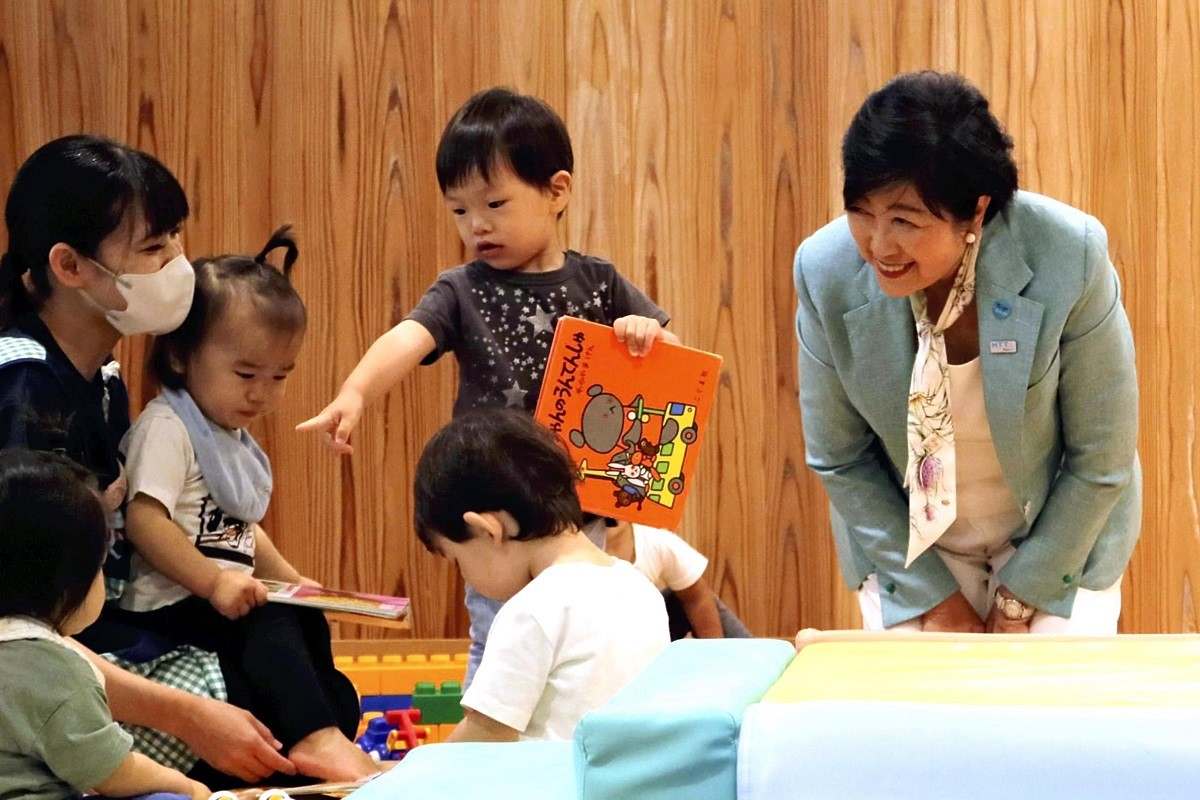Tokyo’s Plunging Fertility Rate Sets Off Alarm Bells; Big Cities Put Drag on National Rate

Tokyo Gov. Yuriko Koike, right, visits a childcare center at the Tokyo Metropolitan Government Building in Shinjuku Ward on May 30.
1:00 JST, June 7, 2024
Japan’s fertility rate continues to drop, and the latest health ministry figures are setting off a fresh wave of alarm bells as local governments scramble to reverse the trend.
The nation’s total fertility rate, the average number of children a woman likely will give birth to in her lifetime, dipped to a record-low 1.20 in 2023. The rate dropped in every prefecture and shows no sign of being turned around. Shock and a sense of frustration reverberated within the Tokyo metropolitan government after the fertility rate for the capital fell below 1 to a record low of 0.99.
“Now is the last chance to stem the population decline,” a stern-faced Tokyo government official said. “All we can do is tackle this issue with a sense of urgency.”
The fertility rate for the Tokyo metropolitan area has been trending downward since it peaked at 2.02 in 1971.
Many young people from around Japan move to the capital, which is home to 14% of women in the main child-bearing age demographic of 20 to 39. But according to the 2020 national census, Tokyo has a higher percentage of unmarried women than any other prefecture.
Marriage is strongly linked to childbirth in Japan, so a boost in the number of marriages leads directly to more babies being born. And a rise in Tokyo’s total fertility rate would help lift the nation’s overall fertility rate. Last fiscal year, the metropolitan government launched several initiatives intended to encourage people to tie the knot, including a project to develop its own matchmaking app.
The Tokyo government has positioned the chronically low birth rate as an issue of utmost importance, and will spend about ¥1.8 trillion in this fiscal year’s budget on measures to bump up the rate. The metropolitan government has drawn up what it calls “seamless” support to cover each stage, from marriage to childbirth to child-rearing.
The high cost of living has deterred some people from having children. To help combat this, the Tokyo government last fiscal year introduced a system that gives young couples preferential access to low-rent, municipally-run housing, and also began providing ¥5,000 per month to each resident age 18 or under. From this fiscal year, tuition has been made effectively free for Tokyo high schools, including private schools, regardless of the income of a student’s family.
“I’d like to come up with ways to help people plan even slightly brighter prospects for their future,” Tokyo Gov. Yuriko Koike said Wednesday.
However, a senior metropolitan government official admitted the challenge ahead was daunting. “The falling birth rate is due to a combination of various factors. There are limits to what the efforts of a local government alone can achieve,” the official said.
Curbing drift to urban areas
Hokkaido has the second-lowest total fertility rate in the country, according to the Health, Labor and Welfare Ministry statistics announced Wednesday. About 40% of Hokkaido’s population lives in Sapporo, which has seen an influx of women from other parts of the prefecture and elsewhere in Japan. However, a high proportion of men and women in Sapporo have nonregular employment, and the average income is low. According to the 2020 census, 28.4% of women in the city had never married, which was 3.6 percentage points higher than the national average.
In a bid to increase opportunities for young people to meet each other, the Sapporo city government will launch this fiscal year an online service that uses artificial intelligence to help people find a partner. The city also has made childcare free for second and additional children, regardless of household income.
“There are no silver bullets, but we must do whatever we can to help people who want children to actually go ahead and have babies,” said the head of the city government’s planning section.
The total fertility rate is also low in Miyagi, Kanagawa and Osaka prefectures, which are home to major urban centers that draw in people from regional areas. Housing expenses in regional areas are lower than in major cities, and it is often easier to receive parental support while raising children. Stanching the flow of young women from regional areas also will be crucial for reversing the low birth rate.
Masanobu Ogura, a former state minister for dealing with the low birth rate, said the view that “men should work and women should stay at home” remained deeply ingrained in some workplaces and parts of regional areas, and that this was one factor driving women to bigger cities. “Measures to combat the low birth rate in regional areas must consider the issue from the perspective of women’s empowerment in society and gender,” argued Ogura.
Ogura also proposed putting a single cabinet minister in charge of both the women’s empowerment and regional revitalization portfolios.
“If local government leaders become convinced that the issues of gender equality and dealing with the low birth rate are linked, I think that could spark a change in regional areas,” said Ogura.
Top Articles in Society
-

Producer Behind Pop Group XG Arrested for Cocaine Possession
-

Man Infected with Measles Reportedly Dined at Restaurant in Tokyo Station
-

Man Infected with Measles May Have Come in Contact with Many People in Tokyo, Went to Store, Restaurant Around When Symptoms Emerged
-

Woman with Measles Visited Hospital in Tokyo Multiple Times Before Being Diagnosed with Disease
-

Australian Woman Dies After Mishap on Ski Lift in Nagano Prefecture
JN ACCESS RANKING
-

Producer Behind Pop Group XG Arrested for Cocaine Possession
-

Japan PM Takaichi’s Cabinet Resigns en Masse
-

Man Infected with Measles Reportedly Dined at Restaurant in Tokyo Station
-

Israeli Ambassador to Japan Speaks about Japan’s Role in the Reconstruction of Gaza
-

Videos Plagiarized, Reposted with False Subtitles Claiming ‘Ryukyu Belongs to China’; Anti-China False Information Also Posted in Japan























